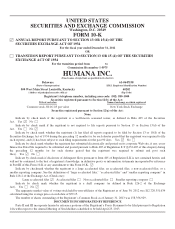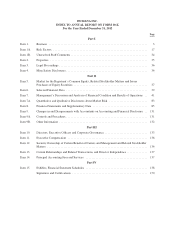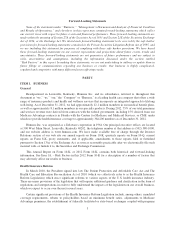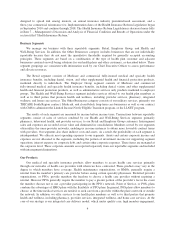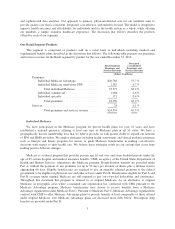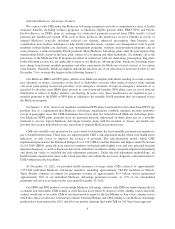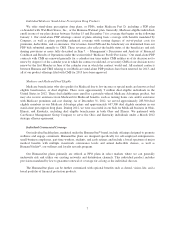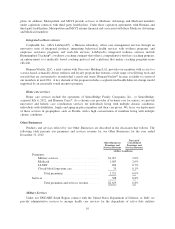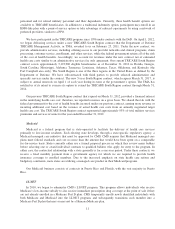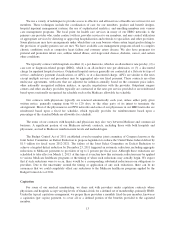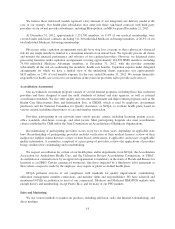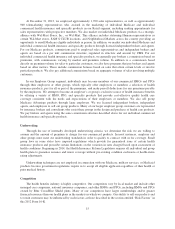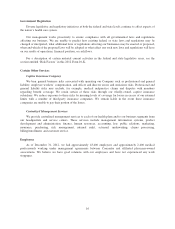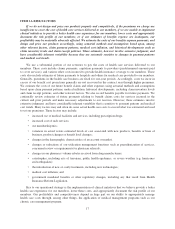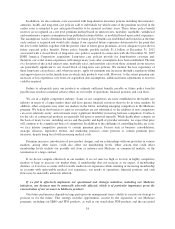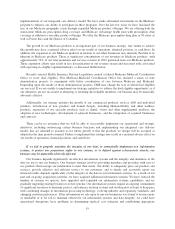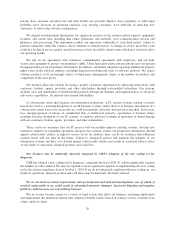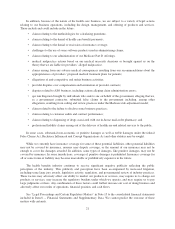Humana 2012 Annual Report Download - page 21
Download and view the complete annual report
Please find page 21 of the 2012 Humana annual report below. You can navigate through the pages in the report by either clicking on the pages listed below, or by using the keyword search tool below to find specific information within the annual report.personnel and for retired military personnel and their dependents. Currently, three health benefit options are
available to TRICARE beneficiaries. In addition to a traditional indemnity option, participants may enroll in an
HMO-like plan with a point-of-service option or take advantage of reduced copayments by using a network of
preferred providers, similar to a PPO.
We have participated in the TRICARE program since 1996 under contracts with the DoD. On April 1, 2012,
we began delivering services under a new TRICARE South Region contract that the Department of Defense
TRICARE Management Activity, or TMA, awarded to us on February 25, 2011. Under the new contract, we
provide administrative services, including offering access to our provider networks and clinical programs, claim
processing, customer service, enrollment, and other services, while the federal government retains all of the risk
of the cost of health benefits. Accordingly, we account for revenues under the new contract net of estimated
health care costs similar to an administrative services fee only agreement. Our current TRICARE South Region
contract covers approximately 3,123,900 eligible beneficiaries as of December 31, 2012 in Florida, Georgia,
South Carolina, Mississippi, Alabama, Tennessee, Louisiana, Arkansas, Texas, Oklahoma, and Kentucky (the
Fort Campbell area only). The South Region is one of the three regions in the United States as defined by the
Department of Defense. We have subcontracted with third parties to provide selected administration and
specialty services under the contract. The new 5-year South Region contract, which expires March 31, 2017, is
subject to annual renewals on April 1 of each year during its term at the government’s option. The TMA has
notified us of its intent to exercise its option to extend the TRICARE South Region contract through March 31,
2014.
Our previous TRICARE South Region contract that expired on March 31, 2012, provided a financial interest
in the underlying health care cost; therefore, we reported revenues on a gross basis. We shared the risk with the
federal government for the cost of health benefits incurred under our previous contract, earning more revenue or
incurring additional cost based on the variance of actual health care costs from an annually negotiated target
health care cost. The TRICARE South Region contract represented approximately 93% of total military services
premiums and services revenue for the year ended December 31, 2012.
Medicaid
Medicaid is a federal program that is state-operated to facilitate the delivery of health care services
primarily to low-income residents. Each electing state develops, through a state-specific regulatory agency, a
Medicaid managed care initiative that must be approved by CMS. CMS requires that Medicaid managed care
plans meet federal standards and cost no more than the amount that would have been spent on a comparable
fee-for-service basis. States currently either use a formal proposal process in which they review many bidders
before selecting one or award individual contracts to qualified bidders who apply for entry to the program. In
either case, the contractual relationship with a state generally is for a one-year period. Under these contracts, we
receive a fixed monthly payment from a government agency for which we are required to provide health
insurance coverage to enrolled members. Due to the increased emphasis on state health care reform and
budgetary constraints, more states are utilizing a managed care product in their Medicaid programs.
Our Medicaid business consists of contracts in Puerto Rico and Florida, with the vast majority in Puerto
Rico.
LI-NET
In 2010, we began to administer CMS’s LI-NET program. This program allows individuals who receive
Medicare’s low-income subsidy to also receive immediate prescription drug coverage at the point of sale if they
are not already enrolled in a Medicare Part D plan. CMS temporarily enrolls newly identified individuals with
both Medicare and Medicaid into the LI-NET program, and subsequently transitions each member into a
Medicare Part D plan that may or may not be a Humana Medicare plan.
11


